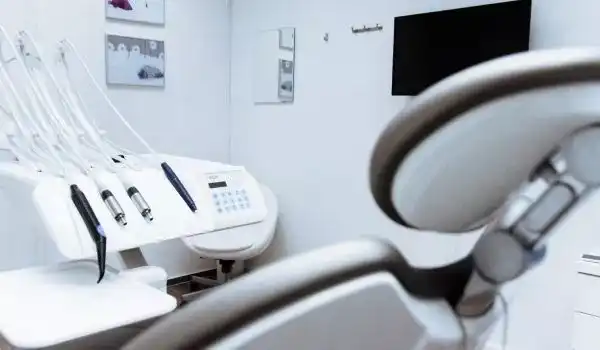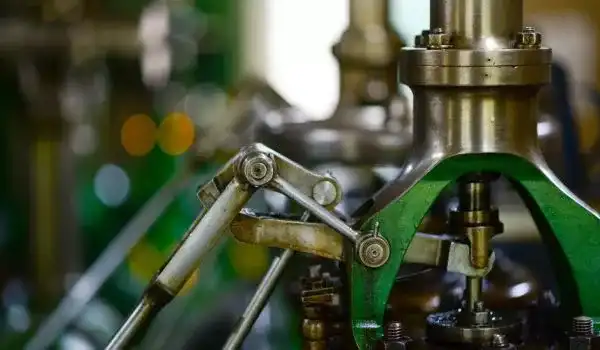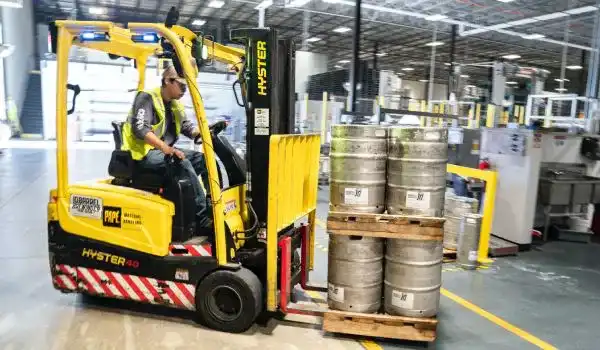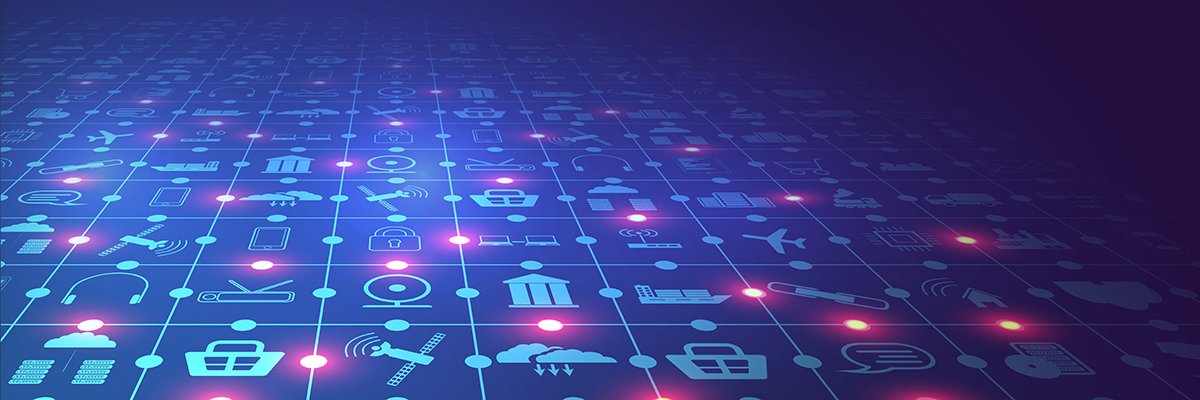The ability to connect things to the Internet has revolutionized the business world. Machines have gotten smarter as a result of IoT (Internet of Things), allowing businesses to produce greater value.
Everything, including phones, watches, buildings, and workplaces, can now link to the Internet and perform previously unimaginable activities.
Many sectors have begun incorporating IoT technology into their business operations and products in anticipation of a bright future in business.
We’ll look at the industries that can benefit the most from IoT development in this article.
Let’s get started.
What is IoT?
IoT, or the ‘Internet of Things,’ is the ever-expanding web of interconnected devices accessible via the Internet.
It’s a collection of linked devices that can interact with one another to carry out a variety of tasks. Each device in the IoT network is linked to a sensor that transmits and receives data from other devices.
In the business world, IoT has several uses. Better efficiency, enhanced operations, and increased income can all result from machines communicating with one another.
Here is a list of industries that we believe would gain the most from IoT implementation.
Sectors that can Benefit the Most from IoT Development
IoT technology, according to Statista, has great potential across industries, with an expected 22 billion IoT devices deployed in 2018. According to the estimate, by 2030, there will be over 50 billion linked IoT devices.
That’s enormous!
As the Internet of Things expands internationally and across sectors, certain industries are driving investments in this revolutionary technology, which is altering how we live and work.
1. Agriculture

Photo Credit: People vector created by pch.vector – www.freepik.com
Technical innovation has always been welcomed by the agriculture business. By adopting IoT, it has become increasingly technology-driven and industrialized.
The analysis by Statista, which shows the global IoT market size of the Agriculture industry in 2018 – 14.79 billion USD – shows the expansion of IoT use in agriculture. By 2030, it is expected to be worth about $30 billion.
Smart agriculture refers to the use of Internet of Things (IoT) technology in agriculture. It collects environmental and machine information using IoT sensors. Farmers may use the data to make better decisions and enhance almost every aspect of their operation, from livestock to crop production.
Use Cases of IoT in Agriculture
Let us take a look at a few IoT use cases in agricultural processes.
- Agricultural Drones
Sensors and cameras are built into agricultural drones. They’re utilized to photograph, map, and survey the farms. Drones are divided into two categories: ground-based drones and airborne drones. Ground drones are wheeled bots that scan the fields.
Aerial drones, on the other hand, are unmanned aerial vehicles or flying robots. Drones may be controlled from afar.
Aside from surveillance, drones may do a variety of jobs that traditionally needed human labor: agricultural planting, insect control, agriculture spraying, crop monitoring, and so on.
- Greenhouse Automation
To regulate the greenhouse atmosphere, farmers frequently utilize physical intervention. They may acquire accurate real-time information on greenhouse parameters including as illumination, temperature, soil condition, and humidity using IoT sensors.
- Monitoring climate conditions
Weather stations and smart agricultural sensors capture environmental data and transfer it to the cloud for analysis. It’s also used to map climatic conditions, choose the best crops, and boost their productivity.
- Cattle monitoring
These IoT farm sensors track animals in the same way as crop sensors do.
- Increased control over the internal processes and lower the production risks
The ability to monitor your production output in advance benefits better product distribution planning.
If you know exactly how many crops you’ll harvest, you can ensure that no extra goods go unsold, lowering the risk.
2. Energy
According to the analysis, the worldwide value of IoT in the Energy industry would be 20.2 billion USD in 2020. By 2025, it is predicted to rise to 35.2 USD.

IoT (Internet of Things) has begun to revolutionize most elements of the energy industry, from generation to transmission to distribution, and has influenced how energy firms and customers interact.
Here are some statistics from another report on the expansion of IoT in the energy sector.
- Almost 47% of Energy sector executives indicate they have implemented IoT across functions.
- Data sources for Energy include the use of machinery (49%) and Robots (46%).
- IoT is deployed by 45% of Energy companies to monitor asset performance.
- IoT is used by 43% of Energy companies to enhance customer experiences.
- 40% of Energy companies reported an overall boost in productivity.
There are many areas where IoT can be very impactful in transforming the Energy sector:
- Remote assets monitoring and management
- Process optimization
- Grid balancing
- Load forecasting
- Smart decision making
- Innovative power solutions
3. Finance

The IoT is getting more secure. Customers and banks have grown accustomed to managing financial transactions through various linked devices.
Smart cashpoints with linked cash vending machines are not uncommon.
Financial firms can correctly analyze risk thanks to the massive volume of data sent and acquired by IoT.
Banks will begin to use sensors and data analytics to acquire a lot more information about clients over time, allowing them to provide customized services. It will assist banks in better understanding how their consumers buy and spend money.
IoT in banking can give further benefits:
- Connected devices can help users cultivate good financial habits and deal with any spending indulgent behavior.
- It can improve the quality of the banking experience.
- Interactive credit card for customers.
- It has automated business processes for banks.
4. Healthcare

The healthcare industry has begun to make full use of IoT technologies.
Tracking systems and real-time health systems are examples of IoT technology in healthcare, and it is responsible for enhancing patient treatment, diagnostics, medical and diagnostic equipment maintenance, and remote procedures.
Correct judgments, proper actions, smart treatment, and hence patient pleasure require connected healthcare.
The following is a list of benefits that IoT devices may give to healthcare organizations:
- Reduced cost for patients
- Remote monitoring of patient’s health
- Reduce the length of the patient’s stay at the hospital
- Devices in wearable fitness bands, blood pressure, heart rate monitoring cuffs, and glucometer give patients personalized attention. These devices can also remind of calorie count, physician appointments, and exercise checks.
- IoT devices with sensors are used to track real-time locations of medical equipment
- Asset management
5. Manufacturing

“IoT technology is the fourth industrial revolution,” says Gillan Taddune, CEO of Banyan Water.
The growth of IIoT (Industrial Internet of Things) is the fourth industrial revolution’s fundamental driving factor.
In Denmark, the World Economic Forum‘s Center for the Fourth Industrial Revolution has been working on IoT projects. These initiatives are resulting in huge social savings.
The industrial industry is now the most active investor in the Internet of Things.
Manufacturing’s most popular IoT applications include:
- Monitoring of the Production flow leads to flow optimization, waste reduction, and the minimization of unnecessary work in process inventory.
- Remote equipment management, allowing for tracking and maintaining of equipment’s performance and cost reduction.
- Condition-based maintenance notifications, helping optimize machine availability.
- Supply chains, where IoT solutions help track vehicles and assets, improve manufacturing and supply chain operations’ efficiency.
6. Retail

Through new and novel use cases, Internet of Things technology assists merchants in lowering operating costs and improving consumer experiences.
Here are some of the benefits that IoT brings to retail shops.
- Improved customer experience
This is accomplished by combining data from security cameras and social media to precisely forecast client behavior and patterns.
- Better supply-chain management
GPS sensors and RFID tags provide a full picture of a product’s path from manufacture to the retail shelf to customer.
- Smart inventory management
Inventory management is a chore for most merchants. Stockouts, overstocking, and shrinking are all caused by inaccurate inventory tracking.
Inventory visibility may be automated with IoT. Procurement planning may be improved with smart inventory management systems.
Based on IoT data analytics, the system automatically reorders supplies just before the product runs out of stock.
- Automated checkout
Customers find checkout to be the most unpleasant process when the store is packed. Checkouts may be automated and personalized with IoT technology.
- Fully automated stores
Customers may pick up the things they want to buy as soon as they enter the store.
Customers may walk out with their purchases, with payment handled instantly and a receipt sent to their phone. Face recognition and comprehensive video coverage of the business are used in the technology.
7. Hospitality

The adoption of IoT has revolutionized the hospitality industry. IoT technology enables guests to have a more customized experience while also reducing their wait time.
Hotels may develop highly individualized rooms using IoT technologies. The amenities of the room may be operated via the guest’s mobile phone or the tablet provided. The rooms with IoT integration would:
- Greet the guest by their name when they enter the room
- Send location data to guests for a smoother arrival
- Allow guests to control room temperature and ventilation, and save their preferences for future check-ins
- Predict repairs and maintenance of devices and alert the maintenance staff on time
There are several creative ways the hospitality industry can leverage IoT technology.
8. Transportation and Logistics

In 2016, the IoT transportation industry was worth $135 billion, and by 2023, it is predicted to be worth $328 billion.
Transportation and logistics face two major challenges: speed and timeliness. By automating and optimizing business operations, Internet-of-things devices are poised to make transportation firms smarter and more efficient.
IoT gives meaningful insights from acquired data, assisting the industry in the following areas:
- Cost-saving and increased profitability
- Making travel more efficient
- Improved operational performance
- Reduced energy use and congestion
- Greater safety
- Ensures real-time visibility
- Improves fleet management
- Supports in the maintenance of vehicle’s health
- Warehouse management
What Are Some of the Most Significant Advantages of IoT?
Let’s look at how businesses might profit from the Internet of Things and its cutting-edge technologies to improve many elements of their operations.
1. Improve Customer Service and Experience
When your consumers’ everyday equipment and gadgets are well-integrated with the IoT, they become remarkable. Businesses should examine their goods and services to see whether they may benefit from IoT.
Cars with IoT integration may compute the length of a trip, evaluate traffic conditions, and calculate fuel usage. Even if you are not at home, a smart doorbell can reveal who is at the door.
Refrigerators can detect when supplies are running low. An air conditioning system that can detect the weather outside and the house owner’s chosen temperature.
2. Increase New Business and Revenue Opportunities
IoT enables new methods for a company to communicate with consumers and streamline business processes, resulting in new business prospects.
3. Enhance Business Safety and Security
IoT devices may be used to monitor buildings and businesses and safeguard individuals from physical hazards.
Businesses can monitor office premises and secure assets by integrating IoT devices with sensors, video cameras, and smart locks. Employees who work in high-risk industries such as manufacturing, real estate, or construction can be followed and warned about hazards on a regular basis.
4. Improve Productivity and Competence
Companies may allocate repetitive duties to smart IoT devices, and they will undoubtedly perform better because they do not take breaks, sleep, eat, have mood swings, or become unwell.
5. Cut Down Operational Costs
Productivity, process efficiency, and asset utilization will all assist to reduce costs.
Predictive analytics and real-time diagnostics, for example, can assist save maintenance costs in a variety of businesses.
6. Collect Data for Business Decisions
Companies may use IoT to track and collect critical data sets that can help them enhance their services and products.
This information can help you with business analysis and decision-making.
7. Add Mobility and Agility to Business
IoT technology helps organizations to allow their employees and workers to work from anywhere.
Many businesses can benefit from this flexibility, including cost savings (office leases are expensive) and the ability to hire a large number of remote staff.
Create Powerful IoT Applications with WDX Technologies
If you plan to create an innovative IoT strategy for your business and get the maximum benefit from this technology, get in touch with us.
We are an award-winning technology company with vast experience in creating IoT platforms for businesses in different sectors. Let’s talk.
Got A New Project?
Book a meeting with one of our team members or get a ball park estimation on your project.
Book A MeetingGet A Rough EstimateFrequently Asked Questions
1. What is IoT?
Internet of Things (IoT) is a network of networked devices that can interact with one another and perform a variety of tasks. Each device in the IoT network is linked to a sensor that transmits and receives data from other devices.
2. Which Sectors can Benefit the Most from IoT Development?
- Agriculture The Agriculture industry has always been very receptive to technical innovation. It has become quite technology-driven and industrialized by embracing the IoT.
- Energy IoT has started revolutionizing most aspects of the Energy sector from generation to transmission to distribution and impacting how energy companies and customers interact.
- Finance The IoT is becoming increasingly secure. Banks and customers have become accustomed to managing financial transactions through different connected devices.
- Healthcare IoT technology in Healthcare is represented by tracking systems and real-time health systems and is responsible for improving patient treatment, diagnosis, medical and diagnostic equipment maintenance, and remote surgeries.
- Manufacturing The rise in IIoT or Industrial Internet of Things is the main driving force of the fourth industrial revolution. The World Economic Forum’s Center for the Fourth Industrial Revolution has been working on some IoT initiatives in Denmark. These initiatives are producing incredible societal efficiencies. Currently, the manufacturing industry is the most prominent investors in the Internet of things.
- Retail The Internet of Things technology helps retailers reduce operational costs and enhance customers’ experiences through new and innovative use cases.
- Hospitality The hospitality industry has transformed itself with the use of IoT. The IoT technology helps deliver a personalized experience for guests and reduce their waiting time. With the help of IoT applications, hotels can create super personalized rooms. The room’s features can be controlled through the guest’s mobile phone or the provided tablet.
- Transportation and Logistics The IoT transportation market was valued at $135 billion in 2016 and is expected to reach $328 billion in 2023. Speed and timing are two priority challenges for Transportation and logistics. Internet-of-things devices are set to make transportation companies smarter and more efficient by automation and business processes optimization.
3. What Are Some of the Most Significant Advantages of IoT?
- Improve Customer Service and Experience
- Increase New Business and Revenue Opportunities
- Enhance Business Safety and Security
- Improve Productivity and Competence
- Cut Down Operational Costs
- Collect Data for Business Decisions
- Add Mobility and Agility to Business
Related Articles
Translating innovation to sustainable business growth.
Let’s Work Together to Create the Future We Want
WDX Technologies helps businesses turn their ideas into successful digital realities. We excel in creating digital solutions that solve critical pain points while making you and your customers the HERO.


